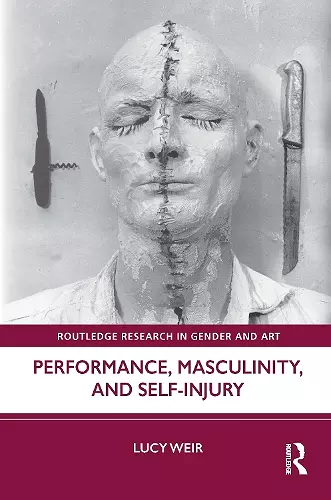Performance, Masculinity, and Self-Injury
Format:Hardback
Publisher:Taylor & Francis Ltd
Published:20th Aug '24
Currently unavailable, and unfortunately no date known when it will be back

This book is an ambitious and expansive examination of the visual language of self-injury in performance art from the 1960s to the present.
Inspired by the gendered nature of discussion around self-harm, the book challenges established readings of risk-taking and self-injury in global performance practice. The interdisciplinary methodology draws from art history and sociology to provide a new critical analysis of the relationship between masculinity and self-inflicted injury. Based upon interviews with a range of artists around the world, it offers an innovative understanding of the diverse meanings behind self-injury in performance, and delves into the gendered coding of self-harming bodies. Individual chapters examine the work of Ron Athey, Günter Brus, Wafaa Bilal, Franko B, André Stitt, Pyotr Pavlensky, and Yang Zhichao, offering a new perspective on the forms and functions of self-injury in performance art.
The book will be of interest to scholars working in art history, performance studies, gender studies, and cultural studies.
'Performance, Masculinity, and Self-Injury offers a compelling, nuanced, sensitive, and provocative engagement with three topics that are rarely discussed together. Explored via a series of diverse case studies, including interviews with the artists, Weir’s analysis offers a vital intervention, unsettling more usual simplistic readings.'
Amy Chandler, University of Edinburgh
'Lucy Weir’s Performance, Masculinity, and Self-Injury charts a lineage from Viennese Actionism via the oeuvre of Günter Brus through the work of André Stitt, Ron Athey, Yang Zhichao, Wafaa Bilal, Pyotr Pavlensky, and Franko B. With care, Weir negotiates a critical re-evaluation of gendered narratives around self-injury, situating the performance practitioners as male hysterics and challenging mythologies of masculinity in crisis.'
Laura Bissell, Royal Conservatoire of Scotland
'Through rigorous critical accounts of maverick artists who have put to great use the compulsive and repulsive powers of violence, injury, and pain, Lucy Weir shows us the split intensity of such actions: how they captivate us, as well as force us to turn away. In this lucid, compelling, and intelligent book, Weir demonstrates that it is in self-directed activities of performed endurance that we may learn most about the politics of bodies, performance, and the self.'
Dominic Johnson, Queen Mary University of London
ISBN: 9781032027098
Dimensions: unknown
Weight: 660g
184 pages